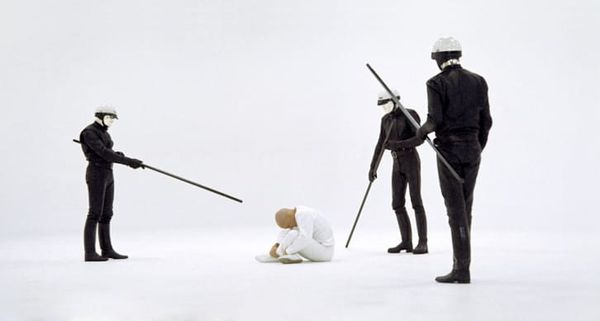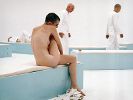Eye For Film >> Movies >> THX 1138 (1971) Film Review
THX 1138
Reviewed by: Niall McCallum

Of the many paths to film fame and fortune, the beginning of the one George Lucas took is perhaps the most incongruous with what followed. Before helping to invent and establish the blockbuster format as we are force-fed it today, Lucas fleshed out his University of Southern California graduate short into a feature length film. The result, THX 1138, is a moody, sinister and largely speechless affair that at first seems as far from Star Wars as Pluto is from the Earth.
Penned by Lucas and sound-design godfather Walter Murch (who also edited the film's integral and landmark soundtrack), THX 1138 concerns the fate of a man, the eponymous THX, and a woman, LUH, who are roommates, incubated in a network of featureless cells, halls and passageways where they live and work.

In this hairless society (actors of both genders were asked to shave their heads for the film), human emotions have been all but eradicated by means of ominous sedatives ingested daily, and inhabitants are judged solely by their ability to be productive. Law is enforced by eerily friendly robots, dressed in camp uniforms as if they were harmless toys despite the truncheons hanging from their belts. If a member of the public is in need of spiritual guidance, the calming and pre-recorded words of a faceless priest can be accessed via cramped booth, the substance of which is designed to answer everything and solve nothing.
We join THX at a pivotal moment in his life, when strange, discontented feelings are beginning to break the surface of his tediously sedate existence. Added to this, he is struggling to suppress desire for LUH and his forgoing of the medication that numbs and stultifies him sends him on a downward spiral toward expulsion from society. After forbidden fornication, LUH is taken from THX and his rebellious search for her leads him to the film's and, arguably, Lucas' most imaginative cinematic invention to date - the prison without walls.
This endless space has only bright, white light for decoration and the lack of distinction between floor, wall and ceiling seems paradoxically to trap inmates in infinity. THX is tortured here in bizarre, ritualistic fashion - this and the deranged, wide-eyed fellow convicts he meets convince him to seek immediate escape.
THX's bid for freedom leads him to encounter a sentient hologram, the extent of the brutality of those in control of his society and an unforgettably stunning car chase. This scene is brilliantly retro-futurist in design, from THX's Scalextric-like escape car to the smooth, metallic tunnel that acts as his route to safety. Combined with snappy editing and several daringly choreographed crashes, the chase makes for one of the most starkly thrilling penultimate scenes in memory.
A technical triumph, THX 1138 is brought vividly to life firstly by excellent set designs, props and costumes, and secondly by its distinctively mechanised soundtrack. The descending whirring of speeding elevators; the intrusive and persistent bleeping of computer prompts; the subtly monstrous gargle of digitised voices picked up by concealed surveillance microphones - the authoritative sonic tapestry of the film's soundtrack lends a plausibility to the notion of machine domination, as if the constant and invasive buzzing and blaring had always existed in this oppressive world and will never leave.
Despite its focus on violent oppression, the seeds from which the Star Wars franchise would soon grow can be detected. The films share bold sets and costumes, holographic characters and central themes of the struggle for freedom and of love. Whereas Luke Skywalker reigns triumphant over all evil however, THX must settle for the possibility only of personal salvation. THX 1138 was thus the first and (for now) last example of the darker, less naive and more challenging aspect of Lucas' cinematic psyche.
It would be criminal not to mention George Orwell's 1984 in any discussion of THX 1138, the spirit of which veritably hangs from the walls of THX's bare and claustrophobic home. Surely even Orwell himself couldn't have resisted raising a knowing eyebrow at Lucas' claim that his film was more realistic representation than fantastical prediction, such was the prescience of the novel's terrifying vision.
Michael Radford's film version of Orwell's masterpiece offers a faithful interpretation, but it is THX 1138 that captures the very essence of its stark warning against totalitarianism, with every frame soaked in the oppressive atmosphere of Orwell's literary imagination.
Reviewed on: 13 Nov 2011

















